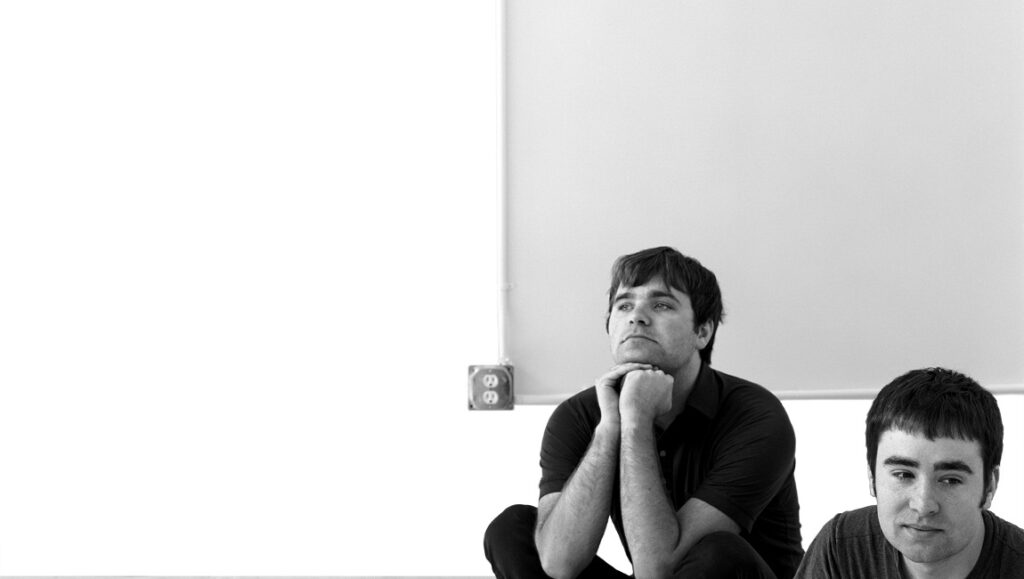In an era when any slob with a next-day delivery synth can create bleep-bloops in their bedroom and go viral overnight, the musical and technological landscape of the new millennium might as well be a different planet. But back in 2001, it was the pre-streaming, pre-YouTube era, and indie scenes mattered a great deal, either clustered geographically (Athens, GA; Omaha, NE; Toronto, Canada) or around certain marquee labels (Merge, Matador, Saddle Creek). We were fresh off the explosion of the NYC dance-punk/garage rock revival but ahead of the full-blown movement posthumously dubbed “indie sleaze.” A certain subset of overwrought teenagers — whom this writer definitely wouldn’t know anything about — cried to Bright Eyes and raged to Desaparecidos; their primetime viewing was equal parts The O.C. and the Iraq War. Oh, and iPods. Rest in power, click wheel.
Given all of this antiquated technology, it’s fitting that one of the biggest bands of the era made their music through the humblest means available: good old-fashioned snail mail. Seattle-based Ben Gibbard, the prototypical soft boi frontman of soon-to-be-indie megastars Death Cab for Cutie, and prolific electro experimentalist Jimmy Tamborello (AKA Dntel), who lived in LA, were scene mates and kindred spirits. Their one previous collaboration was the song “(This Is) The Dream of Evan and Chan” from the latter’s well-received album Life Is Full of Possibilities. It’s long and fuzzy, simultaneously upbeat and muted, and Gibbard’s exceedingly gentle voice cuts through Tamborello’s glitchy production like velvet through velcro. This would become the critically and commercially irresistible template for Give Up, the duo’s 2003 full-length album under the Postal Service moniker (named for the beleaguered agency that ferried their words and instrumentals to each other along the West Coast, and at one point even sold the album on their website). Widely beloved and certified platinum, the album’s ten songs propelled a generation of college radio DJs, music directors, ad execs, and lovesick indie kids to such great heights, the likes of which have arguably never been reached since.
There’s no shortage of self-conscious sincerity in indie rock, and the early 2000s were a hotbed of singer-songwriters wearing their thesauruses on their sleeves. But something about Ben Gibbard — his crunchy-granola Pacific Northwest bonafides? His observational songwriting (no gimmicks here, *cough* Sufjan *cough*)? His downright angelic voice? — had the rare and alluring ability to make listeners feel like actual friends, not therapists or romantic rivals or one-sided confidantes. His lyrics aren’t necessarily confessional; he’s too adept at toggling between perspectives, often with the help of backup singers Jen Wood and Rilo Kiley’s Jenny Lewis. But Give Up’s best songs are shot through with loneliness and self-awareness that’s both relatable and earned. That’s why opener “The District Sleeps Alone Tonight” is such a sucker punch; a line like “I am finally seeing / Why I was the one worth leaving” elegantly signals heartbreak and growth in equal measure: adulthood in a nutshell.
This emotional maturity never veers into self-pity, and complements instead of clashes with the rest of the album’s moony-eyed impulses. And there are plenty, veering from the mechanics of spontaneous combustion (“We Will Become Silhouettes”) to a dream about the JFK assassination (“Sleeping In”). But songs like “Nothing Better” and “Clark Gable” are perhaps the best showcase of the album’s prevailing emotion, which is raw, heartfelt earnestness. In terms of sheer lovestruck bravado, the album’s contemporary torchbearer might just be the Queen of Poptimism herself, Carly Rae Jepsen; both she and Gibbard have a gift for delivering even the cheesiest line with an absolute straight face until you, too, are left believing that there truly is “Nothing better / Than making you my bride / And slowly growing old together.” But it’s not cheesy if it’s true — and, as Gibbard plaintively sings, “I want so badly to believe / That there is truth and love is real.”
After many such songs in a row (plus a quick detour for a bubbly little number about air travel, which is perhaps the ideal thematic match for Tamborello’s naturally buoyant production), “This Place Is a Prison” comes as a tonal shock. It’s almost impossible to make a “gilded cage” metaphor interesting, and the cynicism of the line “What does it take / To get a drink in this place” doesn’t track with Gibbard’s default sincerity (But in the hands of The National? Yes). No matter: Give Up closes with the honeyed fantasy worlds of “Brand New Colony” and “Natural Anthem,” two gorgeously constructed pop confections that start off laughably idealistic before becoming oddly convincing and then eventually downright realistic through sheer force of will. “Everything will change,” Gibbard sings wistfully, not knowing how right he’d be.
Part of Kicking the Canon — The Album Canon.
Published as part of InRO Weekly — Volume 1, Issue 7.


Comments are closed.